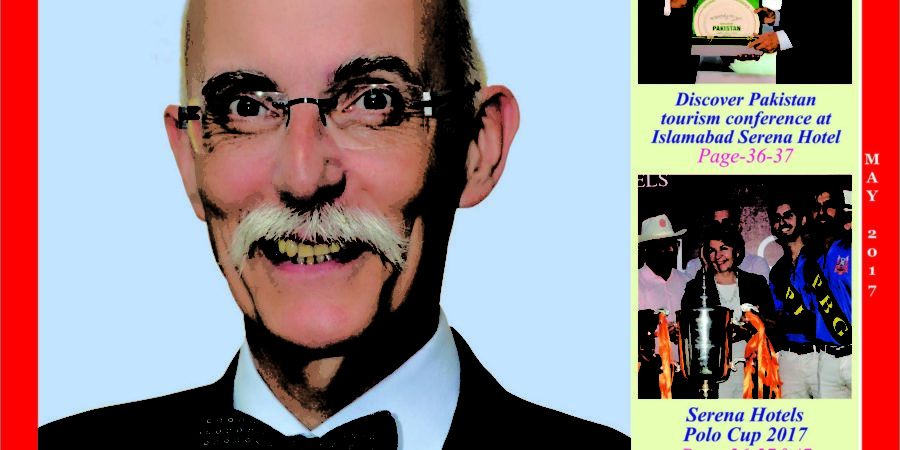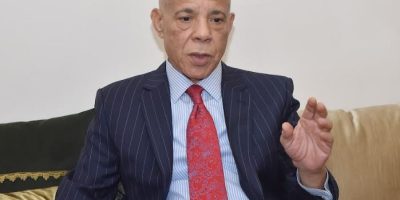Jean Francois Cautain: EU more determined, united after Brexit

Ambassador of European Union talks to Centreline & DNA
Ansar Mahmood Bhatti
The Ambassador of the European Union Jean Francois Cautain talked exclusively to Centreline and Diplomatic News Agency (DNA) on a variety of issues ranging from bilateral to multi-lateral relations. The ambassador also talked about various European as well as regional issues such as Turkish membership to EU, war on terror, women empowerment and trade and educational links between Pakistan and the EU. Here is the text of the interview.
1: Let us begin with 60th anniversary of Treaty of Rome. Can you share with us some background details of this Treaty?
The Treaties of Rome were signed on 25 March 1957 by representatives of Belgium, France, Germany, Italy, Luxembourg and the Netherlands. In two separate agreements, they agreed to establish a European Economic Community aiming to remove barriers to trade, and to foster co-operation in the use of atomic energy. Economic integration, based on the removal of customs duties among member states and the promotion of free movement of goods, services, capital and people, proved such a success that more and more countries in Europe expressed their wish to join in the following years. Areas of co-operation broadened over time and this led to the creation of the European Union. The treaty on establishing the European Economic Community went through several updates and is now known as the Treaty on the functioning of the EU.
The EU is now a place where Europeans can enjoy a unique diversity of culture, ideas and traditions. Europeans have formed life-long bonds with each other and can travel, study and work across national borders. Europe is a pioneer of gender equality, with women’s employment rate now at an all-time high. 6.5 million Europeans are currently working in another EU Member State. 1.7 million Europeans cross a border to work in another Member State every day. 9 million young Europeans have benefitted from the Erasmus programme of educational, vocational and professional exchanges.
In 2017, as we celebrate 60 years of the Treaties we can also say for the first time in ten years that economic growth is back in each and every Member State of the European Union The euro – the common currency in 19 out of 28 EU countries – is used by 338.6 million people every day and is the second currency used in international transactions. The European Union has become the largest trade bloc in the world. The total exports of the EU27 are worth around €5.8 trillion. This represents over one third of total global exports, more than two and a half times China’s exports, and over three times those of the USA. The EU is the top trading partner for 80 countries. Every additional €1 billion in exports supports 15,000 jobs across the EU.
2: How do you see Brexit and its political and economic fall-out both for the UK and EU? Do you think the EU project is in danger after Britain’s pull-out?
The EU regrets that United Kingdom is leaving the European Union, but it is too early to say what economic fallout this will have both for the EU and the UK. We are ready for the process that we now will have to follow. For the European Union, the first step will now be the adoption of guidelines for the negotiations by the European Council.
Brexit has made us, the community of 27, more determined and more united than before. The EU will aim to minimise the costs for the EU citizens, businesses and Member States of the Brexit. At the same time, we are looking ahead to see how the European project can be strengthened to meet future needs and better respond to the legitimate expectations of European citizens.
3: In a speech delivered at ISSI on March 28, 2017, you said, “Our Union is under threat. Our European project, which has brought unprecedented peace, prosperity and democracy, is being questioned…”. Who is threat for EU? Who is questioning peace, prosperity and democracy of EU?
Following the results of the British referendum that has led to the UK leaving the EU, and the rise in popularity in Europe of political parties that are sceptical of the European project, it appears that a number people in Europe are questioning the European Union. It seems that they are not convinced that the EU has brought peace, greater prosperity and greater democracy. It is unfortunate and calls for bold actions from the EU and its Member States to rebuild trust in the EU project.
As I mentioned, we are looking at how the EU can be strengthened and better meet European citizens’ expectations. On the 1st of March the President of the European Commission presented a “White Paper” on the future of the EU. This White Paper was described by President Junker as a new “birth certificate” of a European Union. The document titled “reflections and scenarios for the EU27 by 2025”, identifies 5 scenarios on the future of Europe ranging from the less to the most ambitious. Coming back to the sole single market? Going forward toward a federal Europe? Building a multi-speed European Union? Those are among the possibilities put forward by the Commission and on which the member states and the European Parliament have now to decide, most likely by December this year.
4: In 2014 Pakistan was given GSP plus status and since then we have seen increased business activity but some people think Pakistan and Pakistani businessmen have not fully utilized this facility? Do you agree?
Pakistan’s exports to the EU increased by 38.32% during 2013-16. This confirms that Pakistani exporters are benefitting significantly from GSP+. But I fully acknowledge that there is a lot more to achieve. The potential is remarkably high. I am very satisfied that textile exports are doing well but I always emphasize that Pakistan needs to diversify. And for this purpose, GSP+ offers a great opportunity. For instance, Pakistan being an agricultural country can enhance export of its agricultural product availing the GSP+ [fruits and vegetables for example]. The EU has helped Pakistan improve the export of seafood and kinnow through its Trade Related Technical Assistance. I hope that the exporters, with the support of the Government of Pakistan, will domestically invest in new products in value addition to maximize the increase in exports.
5: Women empowerment is yet another area where EU would like to partner with Pakistan. What do you expect from central and provincial governments in this regard? How can EU help govts in this area?
Gender equality and the fight of violence against women is in the core of our EU policies in Europe and in our partner countries. We as EU have defined in 2016 a new Gender action plan together with the EU MS in order to advance gender equality and women’s empowerment in Europe and around the globe. The thematic priorities are physical and psychological integrity, promotion of economic and social rights and strengthening girls’ and women’s voice and participation.
The promotion of women’ rights and empowerment is an important aspect in all our development programmes in Pakistan. We are already partnering with the Government of Pakistan at federal and provincial levels in different initiatives, i.e. in rural development, education, TVET and nutrition. We appreciate the initiatives the Government of Pakistan, the Parliament, the provincial assemblies, the Commission on the Status of Women and civil society organizations have pushed forward, like the new law on violence against women that was passed last year and recently the inauguration of Pakistan’s first Violence Against Women Centre in Multan. We are ready to support the government with other programmes that are planned as we strongly believe that unleashing the potential of all women in Pakistan will bring more prosperity and stability.
6: The last Pakistan, EU summit was held 2010 and since then there is no contact between two sides at the summit level. Can we expect a third summit any time soon?
Depending on the progress achieved in the relationship, not least in human rights and migration, including readmission, the EU and Pakistan are hoping that a third Summit can take place soon.
7: Some European countries are faced with severe economic crisis and many would say, this crisis is because of Euro? Do you agree? And how would you respond to calls from the euro sceptical people who say euro is an unsuccessful experience so better discontinue it?
According to estimates, 240 million people worldwide (as of 2013)[update] use currencies pegged to the euro. The euro is the second largest reserve currency as well as the second most traded currency in the world after the United States dollar. Currencies are flexible. The rates fluctuate not only due to economies but also due to international political developments.
The European Central Bank and the countries that are members of the EURO are working hard to ensure its stability. New initiatives to strengthen cooperation such as the banking union have already been implemented and more are sure to follow. So I am confident that the Euro will survive and prosper.
8: Promotion of education in Pakistan has always been a priority area for the European Union. Can you spell out your efforts made in this regard? Besides, in Pakistan we have a class-based education system, do you think, the class-based education system is one of the key hurdles in the way of Pakistan’s progress and development?
Let’s be clear, first of all, Education is first the priority of the Government of Pakistan. The EU is here to support Government’s efforts. Indeed we have been supporting education in Pakistan since 1998. Currently we have education programmes in Khyber Pakthunkhwa, Sindh and Balochistan where we are supporting the provincial governments to provide quality education to all boys and girls. It is true that in Pakistan education provision is based on class system, with the poorest of the poor are enrolled in Madrasas, lower income group children are enrolled in public sector schools, middle class children are enrolled at low cost private schools and more expensive private schools cater for the elite class. There are still 22.6 million out-of-school children, and educational inequalities in Pakistan, based on wealth, but also on many other factors, such as gender, disability, geographical location, are among the highest in the world.
The EU is supporting the governments of Sindh, KP and Balochistan to address inequalities in education, by, for example, focusing on girls’ education in all three provinces and providing stipends to out-of-school children in Sindh and Khyber Pakhtunkhwa. It is clear that in order to achieve Sustainable Development Goal on education in Pakistan, increased efforts are needed to address inequalities in education and to ensure that all children have access to quality education.
8: Does Turkey have any chances of becoming EU member any time soon? What in your view are the main reasons of Turkey’s still being out of the EU?
In 1987, Turkey applied to join what was then the European Economic Community, and in 1997 it was declared eligible to join the EU. Accession negotiations with Turkey started in 2005. The accession negotiations are based on Turkey’s own merits and the progress in the negotiations is measured against a series of requirements, among which the respect of democratic values, the rule of law, human rights and fundamental freedoms.
9: As we all agree peace in this region largely depends on relations among Pakistan, India, Iran and Afghanistan. What would you expect from these countries to do in order to ensure regional peace and stability?
I hope the countries in the region will improve not only their bilateral co-operation, but also strengthen their regional co-operation, economically and politically. The normalisation of the ties between India and Pakistan is vital for both countries and the region. A political agreement to end the fighting in Afghanistan would be another important step forward for peace and stability in the region.
10: Please share with us EU perspective of Pakistan’s role in war on terror. Also if you could share your views about CPEC?
The EU fully supports Pakistan’s efforts to eradicate terrorism and co-operates with Pakistan in the field of counter terrorism. The EU believes it is important that a national programme on countering violent extremism is implemented, in the framework of the National Action Plan against terrorism. We agree with Pakistan that the root causes of violent extremism have to be addressed, besides the reforms in law enforcement that are required. Terrorism and radicalisation do not stop at borders. Information-sharing and international co-operation should further be increased as the terrorist threat is also a global one. For the EU, the strict respect of the rule of law and fundamental rights must be at the core of any counter terrorism and de-radicalisation actions.
I know that Pakistan has great expectations with regard to CPEC. I think we will have to wait and see if these expectations are met. Personally, I sincerely hope that the investments in the corridor will bring further increases in economic growth and employment, which is much needed. It would also be interesting to explore how EU companies could be associated to this ambitious regional programme.
Related News

Pakistan-Africa ties poised for a quantum leap
Ambassador of Morocco Mohammad Karmoune says African Continental Free Trade Agreement presents an opportunity forRead More

DR SHUMAILA KHAN: An Aesthetic Physician par excellence
Mudassar Raja INTRODUCTION: Dr. Shumaila Khan is a well-known & energetic Aesthetic Physician, best InjectorRead More


Comments are Closed